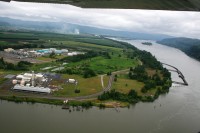Breaking: People-Powered Legal Action
Protect Important Farmland, Salmon Habitat near Controversial Columbia River Port
By Jasmine Zimmer-Stucky, Senior Organizer

You power us to protect salmon and farmland. Because of you, we filed an appeal on March 16, 2018, challenging Columbia County’s second attempt to open 837 acres of high-value agricultural land along the Columbia River to industrial development. 1000 Friends of Oregon, Oregon’s statewide land use watchdog, is joining Columbia Riverkeeper’s appeal.
Hundreds of people, including local farmers and small business owners, urged the county and the Port of St. Helens to protect farmland and salmon habitat from fossil fuel and other heavy industrial development at Port Westward. Yet the port and the county failed to listen.
Port Westward, owned and operated by the Port of St. Helens, is ground zero for a string of controversial fossil fuel developments, including fracked gas, coal, and oil terminals. The Port recently announced plans to renew a lease option with Northwest Innovation Works to build the world’s largest fracked gas-to-methanol refinery at Port Westward. From 2013 to 2015, Global Partners operated an oil-by-rail transshipment facility before resuming ethanol shipments; the company maintains regulatory approval to restart oil shipments. Portland General Electric currently operates two gas-fired power plants at Port Westward. And in 2013 and 2014, the Port failed in attempts to site two coal export terminals at Port Westward.
The high value farmland slated for rezone at Port Westward is part of a vibrant agricultural economy that includes includes prized commodities like mint and blueberries. “Hopville Farms remains disappointed with Columbia County’s decision to open farmland up to industrial polluters,” stated Jim Hoffmann, owner of Hopville Farms. “Our priority is to protect area water quality, which is vital to our blueberry farm and essential to the entire community, both now and in the future.”
We’re excited to represent your values in Oregon’s land use court. Your written comments, oral testimony, and generous financial donations made are the foundation for today’s legal action. Every voice and every dollar will further protections for high value farmland and salmon habitat.
FOR IMMEDIATE RELEASE
Conservation Groups File Lawsuit to Protect Important Farmland, Salmon Habitat near Controversial Columbia River Port
March 14, 2018 (St. Helens, OR)—Columbia Riverkeeper filed an appeal today challenging Columbia County’s second attempt to open 837 acres of high-value agricultural land along the Columbia River to industrial development. 1000 Friends of Oregon, Oregon’s statewide land use watchdog, is joining Riverkeeper’s appeal. The Port of St. Helens proposes doubling the size of its rural Port Westward property for fracked gas-to-methanol refineries, oil-by-rail, and other industrial development. Hundreds of people, including local farmers and small business owners, urged the county to protect farmland and salmon habitat from fossil fuel and other heavy industrial development.
“People value high-yield farmland and strong salmon runs,” stated Jasmine Zimmer-Stucky, Senior Organizer for Columbia Riverkeeper. “Industrializing rural Columbia County with dirty fossil fossil fuel projects like fracked gas-to-methanol refineries and oil-by-rail ignores the public’s legitimate concerns about health and quality of life impacts.”
Port Westward is ground zero for a string of controversial fossil fuel developments, including fracked gas, coal, and oil terminals. The Port of St. Helens recently announced plans to renew a lease option with Northwest Innovation Works to build the world’s largest fracked gas-to-methanol refinery at Port Westward. From 2013 to 2015, Global Partners operated an oil-by-rail transshipment facility before resuming ethanol shipments; the company maintains regulatory approval to restart oil shipments. Portland General Electric currently operates two gas-fired power plants at Port Westward. And in 2013 and 2014, the Port failed in attempts to site two coal export terminals at Port Westward.
“Hopville Farms remains disappointed with Columbia County’s decision to open farmland up to industrial polluters,” stated Jim Hoffmann, owner of Hopville Farms. “Our priority is to protect area water quality, which is vital to our blueberry farm and essential to the entire community, both now and in the future.”
The county’s decision marks the Port of St. Helens’ second attempt to remove agricultural protection for farmland at Port Westward. In 2014, a local farmer, Columbia Riverkeeper. The Oregon Land Use Board of Appeals found the county’s decision to open farmland for industrial development violated Oregon laws designed to protect high-quality farmland and remanded the rezone back to local decision-makers. Despite years of opposition from neighbors, farmers, and conservation groups, the county approved the rezone.
“The Port was given opportunities to correct its proposal and bring it in line with Oregon land use law. Yet the Port’s proposal still fails to comply with Oregon’s laws protecting farmland. When other industrial lands are already available on the Port’s existing property, there is no reason to convert productive farmland for new development,” said Meriel Darzen, staff attorney with 1000 Friends of Oregon.
Columbia Riverkeeper is represented by Crag Law Center, a client-focused law center that supports community efforts to protect and sustain the Pacific Northwest’s natural legacy.
###
Resources:


